心理语言学
心理语言学在语言教学中的应用

心理语言学在语言教学中的应用语言教学一直是人们重视的教育领域,学会一门语言不仅能够让我们跨越语言壁垒,还能够增加我们的就业机会。
而如何更加高效地教授语言成为了教师和学者们一直探索的问题。
近年来,心理语言学的应用逐渐引起人们的关注,它将心理学和语言学结合起来,为语言教学提供了新的思路和方法。
心理语言学研究语言的认知过程和人们对语言的使用。
在语言教学中,了解学生的认知差异是非常重要的。
每个学生在语言学习过程中都有自己独特的思维方式和学习策略。
通过了解学生的学习风格和兴趣爱好,教师可以根据学生的特点制定相应的教学计划和策略。
比如,对于喜欢朗读的学生,可以多进行口语训练,增强他们的口语表达能力;对于爱写作的学生,可以通过写作作业来提高他们的写作水平。
通过了解学生的心理和学习方式,可以更加针对性地进行教学,提高教学效果。
另外,心理语言学的研究还涉及到语言的理解和产生。
在语言教学中,理解和表达是两个至关重要的技能。
理解是指学生对于听力和阅读材料的理解能力,而表达则是指学生的口语和写作能力。
通过运用心理语言学的知识,教师可以帮助学生更好地理解和产生语言。
在提高学生听力理解能力方面,心理语言学强调语境的重要性。
语境可以为学生提供一定的信息,帮助他们理解语言的含义。
教师可以通过控制语境,让学生更容易理解听力材料。
比如,可以给学生提供一段对话或者是一个故事情节,然后让学生根据语境来回答问题,这样可以提高学生的听力理解能力。
在提高学生口语和写作能力方面,心理语言学提供了一些实用的技巧。
一个有效的方法是教授学生一些常用的句子结构和表达方式。
通过学习这些句子结构,学生可以更好地组织语言,提高语言的表达能力。
另外,心理语言学还强调学生的情感态度对于口语和写作的影响。
教师可以通过情感激励和正向反馈来调动学生的学习兴趣和积极性,提高他们的学习效果。
此外,心理语言学还可以帮助教师调整自己的教学方式和教学策略。
通过了解学生的学习方式和认知差异,教师可以根据不同的学生设定不同的教学目标,并且采用合适的教学方法和教学资源。
心理语言学(桂诗春)—新编心理语言学
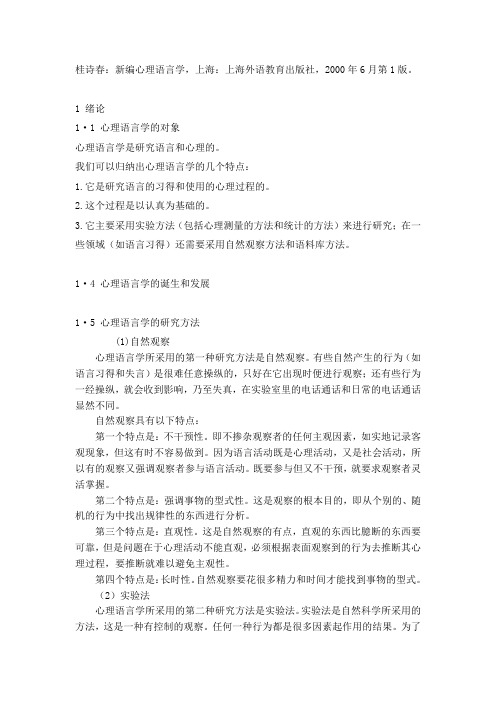
桂诗春:新编心理语言学,上海:上海外语教育出版社,2000年6月第1版。
1 绪论1·1 心理语言学的对象心理语言学是研究语言和心理的。
我们可以归纳出心理语言学的几个特点:1.它是研究语言的习得和使用的心理过程的。
2.这个过程是以认真为基础的。
3.它主要采用实验方法(包括心理测量的方法和统计的方法)来进行研究;在一些领域(如语言习得)还需要采用自然观察方法和语料库方法。
1·4 心理语言学的诞生和发展1·5 心理语言学的研究方法(1)自然观察心理语言学所采用的第一种研究方法是自然观察。
有些自然产生的行为(如语言习得和失言)是很难任意操纵的,只好在它出现时便进行观察;还有些行为一经操纵,就会收到影响,乃至失真,在实验室里的电话通话和日常的电话通话显然不同。
自然观察具有以下特点:第一个特点是:不干预性。
即不掺杂观察者的任何主观因素,如实地记录客观现象,但这有时不容易做到。
因为语言活动既是心理活动,又是社会活动,所以有的观察又强调观察者参与语言活动。
既要参与但又不干预,就要求观察者灵活掌握。
第二个特点是:强调事物的型式性。
这是观察的根本目的,即从个别的、随机的行为中找出规律性的东西进行分析。
第三个特点是:直观性。
这是自然观察的有点,直观的东西比臆断的东西要可靠,但是问题在于心理活动不能直观,必须根据表面观察到的行为去推断其心理过程,要推断就难以避免主观性。
第四个特点是:长时性。
自然观察要花很多精力和时间才能找到事物的型式。
(2)实验法心理语言学所采用的第二种研究方法是实验法。
实验法是自然科学所采用的方法,这是一种有控制的观察。
任何一种行为都是很多因素起作用的结果。
为了弄清楚这些因素的不同的作用,我们往往需要把其他各个因素控制起来,而专门操纵某因素,使它作系统的改变,从而观察其作用。
实验法包括以下五个方面:1.理论:实验的目的是为了验证某一种理论、学说或观点。
这是实验的出发点。
《心理语言学》课件

05
心理语言学面临的挑战与展望
跨文化研究挑战
文化差异对心理语言学的影响
不同文化背景下的语言使用和认知方式存在差异,如何克服这些差异,建立跨文 化的心理语言学理论是当前面临的重要挑战。
语言与文化的关系
语言是文化的重要组成部分,语言使用和认知方式受到文化的影响。在跨文化研 究中,需要深入探讨语言与文化的关系,以及文化如何影响心理语言学的理论构 建。
研究目的和意义
研究目的
探究语言的认知过程,理解语言与思 维、认知之间的相互作用,为语言障 碍和语言习得的深入研究提供理论基 础。
研究意义
有助于提高语言教育的质量,促进跨 文化交流,为语言障碍的干预和治疗 提供指导。
研究历史与发展
研究历史
心理语言学作为一门独立的学科,起 源于20世纪50年代的美国。早期研究 主要关注语言处理过程中的心理机制 ,随着研究的深入,逐渐形成了系统 的理论体系。
语言障碍治疗
1 2
语言障碍评估
心理语言学对语言障碍的评估标准和方法进行研 究,为语言障碍治疗提供科学依据。
治疗方法
基于心理语言学的理论和方法,开发针对不同语 言障碍的治疗方案,帮助患者恢复语言功能。
3
康复训练
心理语言学在语言障碍康复训练中发挥重要作用 ,为患者提供个性化的康复训练计划,提高康复 效果。
人工智能与机器翻译
自然语言处理
01
心理语言学对自然语言处理的研究,为人工智能和机器翻译技
术的发展提供理论支持。
机器翻译质量评估
02
基于心理语言学的评价标准和方法,对机器翻译的质量进行评
估和改进,提高机器翻译的准确性和流畅性。
人机交互
03
心理语言学在人机交互领域的应用,有助于设计更符合人类语
心理语言学论文范文
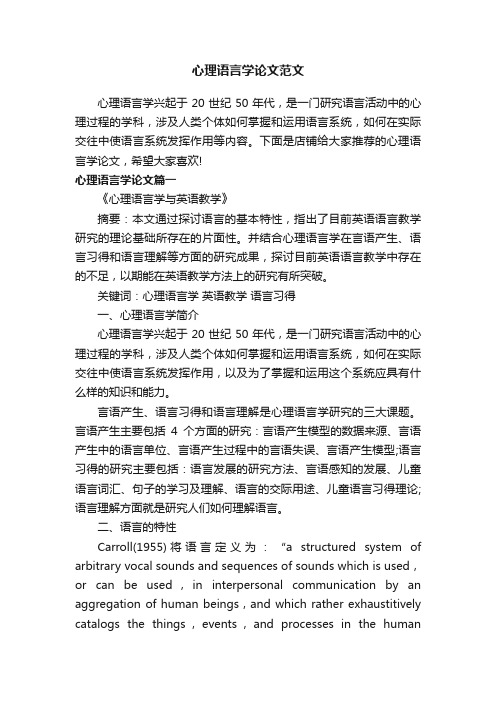
心理语言学论文范文心理语言学兴起于20世纪50年代,是一门研究语言活动中的心理过程的学科,涉及人类个体如何掌握和运用语言系统,如何在实际交往中使语言系统发挥作用等内容。
下面是店铺给大家推荐的心理语言学论文,希望大家喜欢!心理语言学论文篇一《心理语言学与英语教学》摘要:本文通过探讨语言的基本特性,指出了目前英语语言教学研究的理论基础所存在的片面性。
并结合心理语言学在言语产生、语言习得和语言理解等方面的研究成果,探讨目前英语语言教学中存在的不足,以期能在英语教学方法上的研究有所突破。
关键词:心理语言学英语教学语言习得一、心理语言学简介心理语言学兴起于20世纪50年代,是一门研究语言活动中的心理过程的学科,涉及人类个体如何掌握和运用语言系统,如何在实际交往中使语言系统发挥作用,以及为了掌握和运用这个系统应具有什么样的知识和能力。
言语产生、语言习得和语言理解是心理语言学研究的三大课题。
言语产生主要包括4个方面的研究:言语产生模型的数据来源、言语产生中的语言单位、言语产生过程中的言语失误、言语产生模型;语言习得的研究主要包括:语言发展的研究方法、言语感知的发展、儿童语言词汇、句子的学习及理解、语言的交际用途、儿童语言习得理论;语言理解方面就是研究人们如何理解语言。
二、语言的特性Carroll(1955)将语言定义为:“a structured system of arbitrary vocal sounds and sequences of sounds which is used,or can be used,in interpersonal communication by an aggregation of human beings,and which rather exhaustitively catalogs the things,events,and processes in the humanenvironment.”从中我们可归结出语言的三个特性:结构化(structured)、工具性(used in interpersonal communication)、社会现象(catalogs the things,events and processes)。
心理语言学

心理语言学初期发展的理论基础心理语言学的初期发展受到三大理论的影响:一是以华生(J.B.Watson,1878~1858)和斯金纳(B.F.Skinner,1904)为代表的行为主义理论;二是以布隆菲尔德(Bloomfield,1933)为代表的结构主义语言学理论;三是以珊南(C.Shannon,1948)为代表的信息理论。
首先,美国著名心理学家华生所创始的行为主义理论,在俄国生理学家伊凡.巴甫洛夫(Ivan Pavlov:1870~1932)“经典条件反射”理论的基础之上,提出了“客观功能主义”的学说。
他认为,学习就是一种刺激代替另一种刺激建立条件反射的过程。
在华生看来,人的大多数行为都是通过条件反射建立新刺激—反应(S-R)联接而形成的。
继华生之后,斯金纳又在华生的研究基础之上提出了“可操作性条件反射”的理论。
1957年,斯金纳出版的《言语行为》(Verbal Behavior)一书对言语行为作了较为系统的论述。
尽管斯金纳的《言语行为》后来受到了乔姆斯基的批判,但行为主义的“刺激—反射”和“可操作性条件反射”等的心理学理论不但影响着心理学和语言学的研究,而且也为后来发展起来的心理语言学的研究提供了部分的理论根据。
除了行为主义理论,以布隆菲尔德为代表的结构主义理论也为心理语言学的初期发展奠定了基础。
布隆菲尔德的结构主义语言学理论建立在华生行为主义理论的研究基础之上。
其特点是用行为主义的原则研究意义,在确立语言单位时坚持严格的发展程序,总体上关心语言学的自由地位和科学性。
尽管他的理论受到语义学家里奇(Geoffrey Leech)的批评并成了乔姆斯基生成语法的“牺牲品”,然而,布隆菲尔德的研究方法不但在语言学的研究领域被广泛采用,而且也成了心理语言学研究“句子加工”的重要方法之一。
心理语言学的初期发展在很大程度上得益于以珊南(Shannon)为代表的“信息论”的研究。
信息论的研究牵涉到信息的计量、传送、变换、处理和储存。
心里语言学

首先,在语言发展研究方法的探索方面,利奥颇尔德(Leopold,1948)提出的“日记和家长报告”为研究儿童语言的发展提供了 一个重要的途径。利奥颇尔德通过对其女儿希尔得嘉德(Hildegarde)在英语和德语学习方面所取得的进步的观察认为,观察和 研究儿童日记的语言发展有助于对儿童语言发展的有效研究。但后来贝茨(Bares,1991)却认为更有效的途径是家长对其子女语 言表现的观察。因此,儿童日记和家长报告就成了研究儿童语言发展的一大途径。除此之外,观察数据、采访和实验也是研究 语言发展的重要方法。第二,言语感知发展的研究包括3个方面的研究:(1)家长的语言输出和儿童语言学习的关系;(2)儿童早 期言语感知;(3)语言特化。第三,儿童语言词汇研究包括:咿呀学语、单词学习、双词学习、语法联接、词语和词义联接。在 这方面,其研究的重心集中在“词汇和语法知识的获得”、“使用语言能力的获得”和“词语与语义的连接”3个方面。第四 ,句子学习和理解主要包括4个方面的研究:(1)单词和短语向简单句的过渡过程;(2)语法在造句方面所起的作用;(3)句子的形 成 和 理 解 策 略 ; (4) 简 单 句 向 复 杂 句 的 过 渡 以 及 对 较 为 复 杂 语 句 的 理 解 和 使 用 。 第 五 , 在 语 言 交 际 用 途 的 研 究 方 面 , 贝 茨 (Bates,1976)和韩礼德(Halliday,1975)提出的“语用学功能”、奈尔森(Nelson,1973)提出的“指涉和表达功能”成为研究语言功 用的主要理论基础。特别是韩礼德提出的7种语言功能,不但成为语言学研究的一个经典,同时也为心理语言学在语言习得理 论的研究方面提供了一条重要的思考线索。第六,儿童语言习得的过程和方式为语言习得的理论研究提供了重要的思考途径。 但就儿童语言习得理论的研究而论,以斯金纳和布龙费尔德“刺激—反应”或“强化”论为代表的行为主义理论、以乔姆斯基 “天生论”为代表的“遗传”或“传递”理论构成了儿童语言习得理论研究的两大分支。此外,以皮亚杰(Piaget)和布鲁纳 (Bruner)为代表的“认知”理论、由贝茨(Bates)和麦克威尼(MacWhinney)提出的“竞争模型”和由波特提出的“交互作用模型 ”代表了儿童语言习得模型研究的主体内容。由此可见,行为主义的“刺激—反应”理论,心灵主义的“内在”理论,交互作 用理论的“认知”、“信息处理”和“社会交互作用”理论构成了研究儿童语言习得理论的核心,是研究儿童语言习得理论的 重要基础。
心理语言学

语言理解
“语言理解”是心理语言学集中讨论的话题,其研究包括:(1)言语感知;(2)词汇提取;(3)句子加工;(4) 语篇理解。简而言之,就是研究人们是如何理解语言的。
首先,“言语感知”牵涉到“言语感知的研究手段”、“言语感知的条件”、“言语信号的产生和语音的声 学特征”、“元音和辅音的听辨”、“连续性的语音听辨”、“书面语言的感知”和“言语感知模型”共7个方面 的研究。语言感知的研究手段最早是用达得立(H.Dudley,1939)发明的“声音记录仪”(vocoder)记录和分析语 言的输出信息的。后来,制造“声音记录仪”的原理又促使“声音摄谱仪”(soundspectrogram)的出现和发展。 这是按照声音频率的分布,专门用来分析语言信号的“二战”期间的生成物。到了20世纪60、70年代,受声学语 音学和发音语音学的影响,又出现了“电子肌动记录仪”(electromyography)和“电子记波 仪”(electrokymography),分别用来记录肌肉收缩时所产生的电压变化和说话时口、鼻腔的气流变化。当然, 最新的研究手段当属“摄影摄像技术”(cineradiography),人们用该技术记录发音的动态变化。在语言感知条 件的研究方面,“语境”是影响言语感知最为重要的条件。语言信号产生方面的研究,大都与“声学特征”、 “元音和辅音的听辨”相关。这是一项较为复杂的研究,是一项以英语语言为研究对象的“音素”听辨研究。语 言感知研究的另一个领域是“书面语言理解”的研究。这牵涉到“视觉感应”、“字母辨认”、“词意确定”以 及“信息记忆”和“信息组织”等方面的探索。当然,语言感知研究最为重要的领域当属“言语感知模型”的研 究。
研究方法
心理语言学的研究方法在很多地方借鉴了心理学的心理测量(psychometrics)方法。这种方法主要是测量知 识、能力、态度和个性的倾向。心理语言学对其所研究的对象,如语言的习得、学习和使用的心理过程所提出的 种种理论都必须经过系统的自然观察(naturalobservation)或实验方法(experimentalmethods)的验证,才能 判明其是否有效。
心理语言学

▪ 自冯特以后,出现了一大批对大脑和语言之间的 关系发生了深厚兴趣的语言学家、心理学家和人 类学家。
▪ 早在20世纪初,人类学家勃斯(Franz Boas,1858~1942)就预言,语言学和心理学的研 究很可能会促使一门新的学科的建立。受冯特的 影响,勃斯把研究的重心从人类行为转移到文化 现象的心理学因素和环境条件的心理学描述板等 的研究方面。到了1938年,他出版了《原始人的 心质》(The Mind of Primitive Man),为20世纪 30年代末、40年代初“心理的语言 学”(psychological linguistics)、“心理语言 学”(psycholinguisties)和“语言心理 学”(linguistic psychology)的出现奠定了基础。
▪ 继华生之后,斯金纳又在华生的研究基础之上提 出了“可操作性条件反射”的理论。1957年,斯 金纳出版的《言语行为》(Verbal Behavior)一书 对言语行为作了较为系统的论述。尽管斯金纳的 《言语行为》后来受到了乔姆斯基的批判,但行 为主义的“刺激—反射”和“可操作性条件反射” 等的心理学理论不但影响着心理学和语言学的研 究,而且也为后来发展起来的心理语言学的研究 提供了部分的理论根据。
因此,心理语言学的主要研究内容是:言语 的产生、言语的理解以及儿童的语言获得问题。
▪ 心理语言学是近几十年来发展起来的、与心理学 和语言学研究既有重叠和交叉,又有其独到研究 领域的新学科,是一门综合语言学和心理学研究, 重点探索人类心智本质和结构的科学。
▪ 心理语言学的诞生,基本上可归源于心理学之父 ——结构主义学派的创始人——冯特(Wilhelm Wundt:1832~1920)的研究。1879年,冯特在莱比 锡大学建立了世界上第一个心理实验室,开始并 从事心理物理学的实验工作。1874年,他出版了 《生理心理学原理》(Principles of Physiological Psychology)一书,探究了人类的 心质结构和意识。在冯特晚年的探索中,他很重 视语言问题的研究,发表过很多与语言心理学相 关的文章和著作。无论是后来的格式塔心理学还 是现在的心理语言学,其研究均不同程度地受到 了冯特研究的影响。
心理语言学的发展与未来展望

心理语言学的发展与未来展望心理语言学是语言学和心理学的交叉学科,其目标是研究语言使用与思维、情感、个体差异等心理过程的关系。
随着语言和心理学的发展,心理语言学也逐渐成为了一门独立的学科。
现在,我们已经迈入了一个全新的时代,心理语言学也不断地发展和改进。
本文将结合心理语言学的发展历程和未来展望,阐述心理语言学的发展方向及其意义。
心理语言学的发展历程心理语言学从20世纪初就开始发展,但是其真正迅速发展起来还是在20世纪60年代。
当时,Chomsky的生成语法和语音学理论与心理学的认知心理学相结合,推动了心理语言学的繁荣发展。
此后,心理语言学开始涉及到更广泛的领域,如:词汇和句子处理、语言习得和发展、语言认知、言语障碍等。
心理语言学的出现促进了语言学和心理学的一系列研究并提出了很多颇有影响力的理论。
在20世纪80年代以后,心理语言学开始获得越来越多的注意。
实证心理语言学成为了心理语言学的主流方法,这种方法用实验和统计技术研究语言和心理行为之间的关系。
心理语言学兴起的原因是它能够提供关于语言加工的清晰细致的信息,同时还能帮助心理学和言语病理学等学科研究与语言有关的问题。
未来展望虽然心理语言学已经取得了重大的研究成果,但是仍然有很多重要问题需要研究。
未来心理语言学的研究将集中于以下几个方面:1. 深层语意的研究目前,大多数心理语言学研究集中于词汇和句子的处理。
而对于句子中的深层意义,很少有系统性的研究。
未来,心理语言学将更多地关注语言的深层语意和语义加工。
2. 跨语言和文化的研究跨语言和文化的研究是未来心理语言学的重点之一。
这种研究可以更好地理解不同语言和文化之间的差异,同时也可以探讨跨语言和文化的语言处理的机制和神经基础。
这种研究可以深入地探讨人类原有的语言和认知机制与文化环境的关系。
3. 语言治疗、干预和教育越来越多的证据表明,语言治疗、干预和教育能够改善言语障碍,同时也有助于提高语言能力。
心理语言学的研究可以为语言治疗、干预和教育提供指导和支持。
心理语言学的定义、研究对象和研究内容

美国的学者们在1952年成立了语 言学与心理学委员会,1954年又 出版了《心理语言学: 理论和研究 问题概述》。 这标志着心理语言
学的正式诞生。
1、美国第一代的心理语言学家是在行为主义 心理学、结构主义语言学和信息论的影响下 进行研究的。奥斯古德指出,语言在刺激和 反应之间能起传递作用,例如一说“狼来 了”,大家就警觉起来。但是狼真的来了人 们才怕,如果虚报过几次,即使再说“狼来 了”,人们也不怕了,可见词语和事实的作 用并不完全相同。米勒把信息论运用于语言 研究,发现词在话语中出现有一定的频率,可 用概率来表示。但是人们如何使用语言,单 靠信息论还是说明不了。
定义 主要研究对象 基本发展概况 基本研究方法 主要研究成果 主要价值发展前景 亟待解决的问题 参考文献
一、定义:
心理语言学是研究语言活动中的心理过 程的学科,它涉及人类个体如何掌握和 运用语言系统,如何在实际交往中使语 言系统发挥作用,以及为了掌握和运用 这个系统应具有什么知识和能力。
它是语言学和心理学跨学科研究的一门 边缘性学科。《应用语言学概论》— 于根元主编
3、现在学者们认识到,心理语言学研 究不能局限于验证某一语法模式是否 正确,而应建立自己的独立体系,于是 出现了第三代心理语言学家。他们不 赞成对言语过程作抽象的分析,而强 调在语言环境中进行实验,借以探测 思维和交际的过程。
四、研究方法:
主要是用实验和自然观察来探讨语言行为的规律。
《通过大量的观察和分析发现了儿童在语言学习过程中表现出的 较一致的、特定的行为表现: 字词学习: 9-12个月——第一个指示词; 意义表达: 大约在18-24个月,儿童开始将词组合在一起,出现双词话语, 如,“要饼干”等; 电报体言语:这种言语的特点是保留了正常句子中与意义表达关 系密切的词,如名词、动词、形容词和副词,而省略掉了那些虽 然有重要的句法作用,但不是意义表达所必须的词,如介词、冠 词、助动词和量词等。
<什么是心理语言学>读书笔记

1、关于自己语言的语音信息
2、关于句子构成的句法信息
3、关于词和词的组合的意思的词汇信息
4、关于他所生活和谈论的世界的感念知识
5、某些信念系统,以评估他所听到的信息
三、记忆和语言
人的认知能力可以体现为心理表征(mental représentations),他有不同的层面,从感知、注意、记忆、语言到思维、问题求解。在这些心理表征中,记忆占了十分重要的位置,就相当于一部计算机的中央处理器和它的记忆装置一样。
注意的容量是有限的,我们首先是注意那些传递信息的消息,特别是词汇,到最后才是那些语言中多余的形式特征。
控制和自动化是注意的处理系统的一对矛盾。
注意的容量有限有两种,一种是资源限制(resource limitations)另一种是数据限制(data limitations)。
STM的容量也是有限的。大概为7+-2,7好像是我们接受、处理和记忆信息的一个限制。
按照信息处理模型,长时记忆(long-term memory,LTM),又叫永久记忆(permanent memory),意思是事物在记忆里可以长期保存。它是我们的记忆系统另一个重要组成部分,它和WM相辅相成,联合行动。
LTM是我们保存过去的、未经激活(即不在WM里)的信息和世界知识的仓库,包括语义记忆(semantic memory),指的是一般的知识(如语法和算术规则)、情节性记忆(episodic memory,指的是每个人的经验(如童年的回忆)。自动记忆(automatic memory),亦称条件反应记忆(conditioned response memory),指的是某些可以自动激发信息的回忆。
心理语言学的发展与未来展望
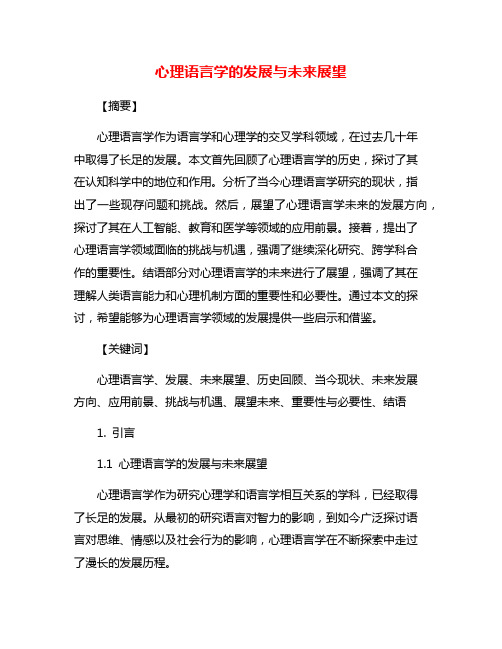
心理语言学的发展与未来展望【摘要】心理语言学作为语言学和心理学的交叉学科领域,在过去几十年中取得了长足的发展。
本文首先回顾了心理语言学的历史,探讨了其在认知科学中的地位和作用。
分析了当今心理语言学研究的现状,指出了一些现存问题和挑战。
然后,展望了心理语言学未来的发展方向,探讨了其在人工智能、教育和医学等领域的应用前景。
接着,提出了心理语言学领域面临的挑战与机遇,强调了继续深化研究、跨学科合作的重要性。
结语部分对心理语言学的未来进行了展望,强调了其在理解人类语言能力和心理机制方面的重要性和必要性。
通过本文的探讨,希望能够为心理语言学领域的发展提供一些启示和借鉴。
【关键词】心理语言学、发展、未来展望、历史回顾、当今现状、未来发展方向、应用前景、挑战与机遇、展望未来、重要性与必要性、结语1. 引言1.1 心理语言学的发展与未来展望心理语言学作为研究心理学和语言学相互关系的学科,已经取得了长足的发展。
从最初的研究语言对智力的影响,到如今广泛探讨语言对思维、情感以及社会行为的影响,心理语言学在不断探索中走过了漫长的发展历程。
未来,心理语言学将继续深化研究,探索语言与认知、情感、社会之间更为微妙的关系。
随着科技的不断进步,语言数据的获取和分析也将更加便捷,使得研究范围和深度得以拓展。
跨学科的合作将成为未来发展的趋势,心理语言学将与神经科学、计算机科学等学科有更多的交叉融合。
未来发展的方向包括对语言习得、语言失语症等领域的深入研究,以及在应用层面探索心理语言学在教育、心理健康、人机交互等领域的潜在应用价值。
而在面对挑战时,心理语言学需要不断挑战传统观念,勇于创新,同时也需要应对跨学科研究带来的挑战,以更开放的心态迎接机遇,推动心理语言学在未来更加辉煌的发展。
2. 正文2.1 历史回顾20世纪初,心理学家沃尔特·普林格(Walter B. Pitkin)首次提出“语言暗示”(language suggestion)的概念,带动了心理语言学的发展。
心理语言学测试题及答案
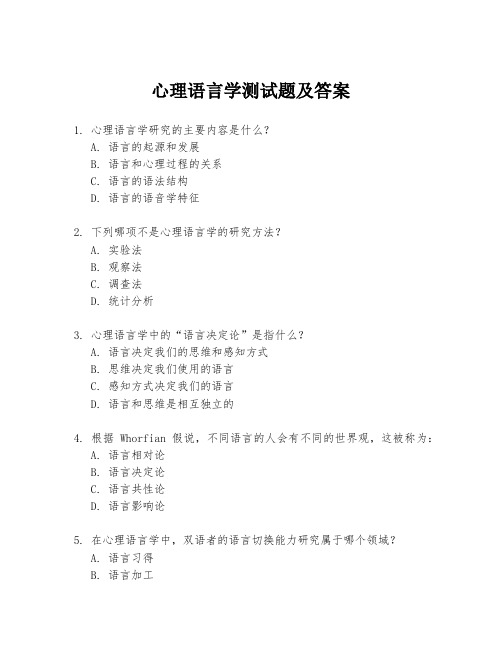
心理语言学测试题及答案1. 心理语言学研究的主要内容是什么?A. 语言的起源和发展B. 语言和心理过程的关系C. 语言的语法结构D. 语言的语音学特征2. 下列哪项不是心理语言学的研究方法?A. 实验法B. 观察法C. 调查法D. 统计分析3. 心理语言学中的“语言决定论”是指什么?A. 语言决定我们的思维和感知方式B. 思维决定我们使用的语言C. 感知方式决定我们的语言D. 语言和思维是相互独立的4. 根据Whorfian假说,不同语言的人会有不同的世界观,这被称为:A. 语言相对论B. 语言决定论C. 语言共性论D. 语言影响论5. 在心理语言学中,双语者的语言切换能力研究属于哪个领域?A. 语言习得B. 语言加工C. 语言产出D. 语言理解6. 下列哪项不是心理语言学研究的范畴?A. 语言与记忆的关系B. 语言与情绪的关系C. 语言与文化的关系D. 语言与数学的关系7. 心理语言学中的“语义饱和”现象是指什么?A. 长时间注视一个词会使其变得陌生B. 语言的复杂性导致理解困难C. 语言的重复使用导致表达能力下降D. 语言的多样性导致思维混乱8. 在心理语言学中,哪个理论认为语言结构影响我们对世界的认知?A. Chomsky的生成语法理论B. 认知语言学C. 行为主义语言学D. 社会语言学9. 心理语言学中的“认知负荷”是指:A. 语言理解过程中的认知压力B. 语言产出过程中的认知压力C. 语言习得过程中的认知压力D. 语言切换过程中的认知压力10. 下列哪项是心理语言学研究的一个重要发现?A. 所有语言都有相同的语法结构B. 语言习得存在关键期C. 语言是思维的障碍D. 语言和文化是完全独立的答案1. B2. D3. A4. A5. B6. D7. A8. B9. A10. B这些测试题旨在帮助学生了解心理语言学的基本概念和理论,并能够应用这些知识来分析语言现象。
通过这些问题,学生可以更好地理解语言是如何与我们的心理过程相互作用的。
《心理语言学》课件
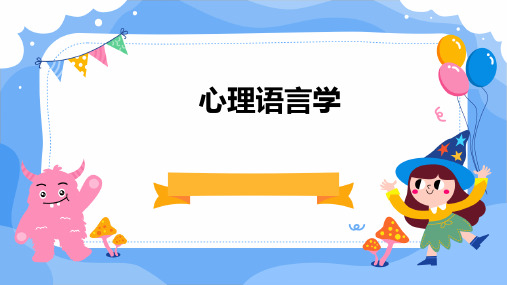
思维对语言的影响
思维驱动语言表达
人们通过思维对事物进行认知、分析和判断, 进而形成语言表达的内容。
思维决定语言表达方式
不同的思维方式会影响人们对同一种事物的表 达方式,从而形成不同的语言风格。
思维创新语言
随着思维的发展,语言也在不断演变和创新,新的词汇、表达方式和语法结构 不断涌现。
语言与思维的相互作用
THANKS
感谢观看
03
语言与思维的关系
语言对思维的影响
语言是思维的载体
语言为人类提供了表达和交流思想的工具,使得思维 能够被记录、传递和共享。
语言塑造思维方式
语言的结构、语法和词汇会影响人们对世界的认知方 式,从而影响人们的思维方式。
语言限制思维广度
语言的有限性决定了人们思维的边界,限制了人们的 想象力和创造力。
长期记忆
长期记忆是储存和提取长期语言知识的关键,包括词汇、语法规 则、句型等。
记忆与学习
语言记忆与语言学习密切相关,良好的记忆能力有助于提高语言 学习的效果。
语言理解
词汇理解
词汇理解是对词汇意义的获取和 加工,包括对词义、词性、词组 搭配等的理解。
句子理解
句子理解是对句子意义的获取和 加工,包括对语法结构、语义关 系、语境信息的理解。
心理语言学
目录Байду номын сангаас
• 心理语言学概述 • 语言认知过程 • 语言与思维的关系 • 语言习得与发展 • 语言障碍与治疗 • 心理语言学的应用
01
心理语言学概述
定义与特点
定义
心理语言学是研究语言的心理过程的 学科,主要探讨语言与认知、情感、 动机等心理因素之间的关系。
特点
心理语言学关注语言使用中的心理过 程,包括语言的感知、记忆、理解、 产生等,强调语言与思维、认知的相 互作用。
心理语言学研究的三个主要方面
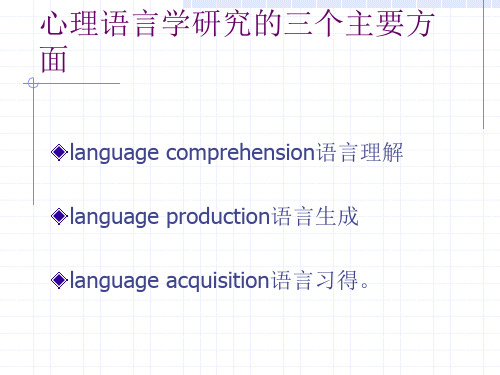
Sound goes from speaker's mouth to hearer's ear [auditory system] Speech is decoded into linguistic form Linguistic form is decoded into meaning
Models of Producion
the basic loop occurring in the creation of language consists of Message Encode Message into linguistic form Encode Linguistic Form into speech [motor system]
Minimal Attachment theory(最小接触理 论)解释了人们为了提高效率,起初会 去构建最为简单(或最不复杂)的句子 结构。
Discourse/text interpretation话语/语篇理 解 话语或语篇作为一种语境,影响着句子与单词 层面的解释,并且暗示着在某个方向上对可 有的词或词组的解释。在试图理解句子时, 人们经常使用句子中本身并不直接包含的信 息——语境信息。——
一,language production
In linguistics, language production is the production of spoken or written language. It describes all of the stages between having a concept, and translating that concept into linguistic form
心理语言学研究的三个主要方 面
第九章 心理语言学
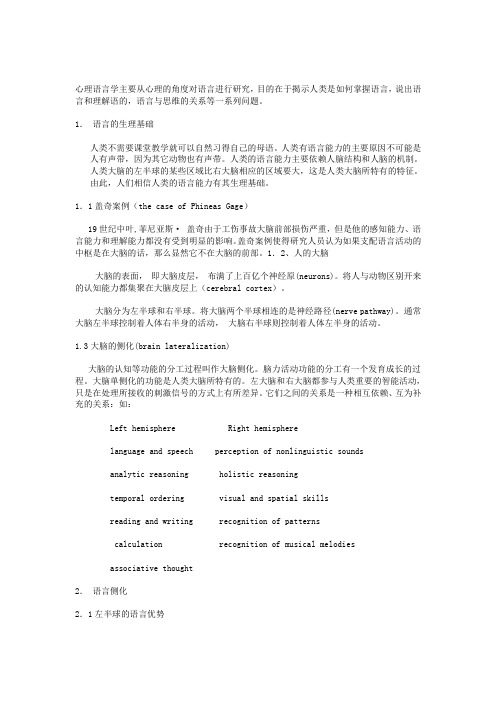
心理语言学主要从心理的角度对语言进行研究,目的在于揭示人类是如何掌握语言,说出语言和理解语的,语言与思维的关系等一系列问题。
1.语言的生理基础人类不需要课堂教学就可以自然习得自己的母语。
人类有语言能力的主要原因不可能是人有声带,因为其它动物也有声带。
人类的语言能力主要依赖人脑结构和人脑的机制。
人类大脑的左半球的某些区域比右大脑相应的区域要大,这是人类大脑所特有的特征。
由此,人们相信人类的语言能力有其生理基础。
1.1盖奇案例(the case of Phineas Gage)19世纪中叶,菲尼亚斯· 盖奇由于工伤事故大脑前部损伤严重,但是他的感知能力、语言能力和理解能力都没有受到明显的影响。
盖奇案例使得研究人员认为如果支配语言活动的中枢是在大脑的话,那么显然它不在大脑的前部。
1.2、人的大脑大脑的表面,即大脑皮层,布满了上百亿个神经原(neurons)。
将人与动物区别开来的认知能力都集聚在大脑皮层上(cerebral cortex)。
大脑分为左半球和右半球。
将大脑两个半球相连的是神经路径(nerve pathway)。
通常大脑左半球控制着人体右半身的活动,大脑右半球则控制着人体左半身的活动。
1.3大脑的侧化(brain lateralization)大脑的认知等功能的分工过程叫作大脑侧化。
脑力活动功能的分工有一个发育成长的过程。
大脑单侧化的功能是人类大脑所特有的。
左大脑和右大脑都参与人类重要的智能活动,只是在处理所接收的刺激信号的方式上有所差异。
它们之间的关系是一种相互依赖、互为补充的关系:如:Left hemisphere Right hemispherelanguage and speech perception of nonlinguistic soundsanalytic reasoning holistic reasoningtemporal ordering visual and spatial skillsreading and writing recognition of patternscalculation recognition of musical melodiesassociative thought2.语言侧化2.1左半球的语言优势语言侧化(linguistic lateralization)指语言能力在大脑神经系统中的分工。
- 1、下载文档前请自行甄别文档内容的完整性,平台不提供额外的编辑、内容补充、找答案等附加服务。
- 2、"仅部分预览"的文档,不可在线预览部分如存在完整性等问题,可反馈申请退款(可完整预览的文档不适用该条件!)。
- 3、如文档侵犯您的权益,请联系客服反馈,我们会尽快为您处理(人工客服工作时间:9:00-18:30)。
The Advantages Of Children Compared With AdultsOn Second Language AcquisitionNowadays, Along with frequent contact with other countries in the world, especially the English-speaking country, second language acquisition has been a hot topic that is popular in China. Many scholars think that individual differences are very important factors that may greatly affect the process of second language acquisition, including age, motivation, cognitive factors and so on. These differences vary, and have direct impact on learning achievement and ultimately the availability of a second language. Some parents push their children to learn second language, for example, English, as early as possible. Because they consider that the younger the easier to learn second language. This paper will analyze the advantages of children second-language acquisition compared with adults from the aspect of memory ability, cognition and emotion.Firstly, the key period to learn language is between 2 to 12 years of age. There was a famous theme--The Critical Period Hypothesis, presented by Lenneberg in 1960s. He thought that the human brain in 2 to 12 years of age can acquire language easier due to the impact of Language Acquisition Device (LAD) in brains. Because both hemispheres of the brain join in learning language. That’s why young children have an extraordinarymemory ability. For example, a poem, even he is too young to realize the artistic conception, can be easily kept in mind without any frustration. Because children under 7 years display a phenomenal ability at rote memorization. Older children, however, do not, with some decline from about 12 years of age.Secondly, the development of cognition has leg effect on second language acquisition. Children learn their native language and second language depending on LAD which allows children to acquire language spontaneously in relaxed atmosphere, while adults usually use their cognitive abilities to learn language consciously. As people grow older, their brain functions come to stay. This is supported by The Critical Period Hypothesis, which regard 12-13 years old as the important watershed in acquiring language abilities. 12-13 years old is also one’s adolescent period, during which the human brain is liberalized. For example, different function sectors are formed, thus lost its anterior instinctive abilities in language acquisition. Before the Critical Period, the children is in a definitely advantage place in learning language. What they learned is most easily and most deeply traced in the brains. During the adolescent period, for example, 11-17 years old, mother language habits have already been formed.Habit is sometimes a barrier that obstructs you to change. Usually, the regulations or rules of your native language can not be applied to a secondlanguage. So in order to learn a second language, the one should set up a new idea and a new consciousness. It is much easier for young children to do so, but for adults, it is hard to get rid of the old grammar rules. One typical example is Arnold Schwarzenegger, who is a foreign-born United States official and because governor of California in 2003. Born in Austria, he moved to the United States when he was 21. At present he speaks english with near-native speaker syntax, but with a strong German accent. That is also to say, children have not formed a native language habit entirely, so they face less obstructions from mother langue in learning second language.Thirdly, emotional factors in second language acquisition play an important role and some western scholars believe that its role is even more important than cognitive factors. The emotional factors may hinder the learners to absorb input information because of a psychological barrier. Children has different learning motivation compared with adults. Learning motivation is a complicated phenomenon consisting of the desire of success, the efforts and satisfaction on goal realization. Generally, children are more likely to integrate to second language, while adults who satisfied with the gained level and capacity are not willing to integrate to second language.In addition, children learn language without the impact of emotional factors and even can not recognize that they are learning language. By this way, children can learn language without pressure. However, with theenhancement of self-awareness, adults have a fear of making language mistakes when they put their second language into use, which reduces not only the opportunities to contact with second language but also the interest of learning second language. That means children usually can keep active attitude in second language acquisition.In conclusion, with good memory, less language cognition and active learning attitude, children have more advantages in learning second language. Therefore, it is an irresistable trend to start English-teaching in childhood in Chinese eduction.References:[1] Ellis, r. (1994). The Study Of Second Language Acquisition[M].Oxford University Press.[2]Krashen, Stephen D. (1988). Second Language Acquisition and Second Language learning. Prentice-Hall Inter national.[3] Skehan, p. (1991,13). Individual Differences In Second Language Acquisition[J]. SSLA.[4] Bista.Krishna K. (2003). Age As An Affective Factors In Second Language Acquisition. NY:Troy University.[5]彭坚,二语习得“关键期假说”的反思性研究【J】.学前教育研究,2007,(5):53-55.[6] 蒋剑云,戴运财,2000(4),年龄与二语习得【J】.山东:山东师大外国语学院学报.[7]杨萍,王小宁.儿童英语学习的优势及原则[J].学前教育研究,2007,(4):28。
